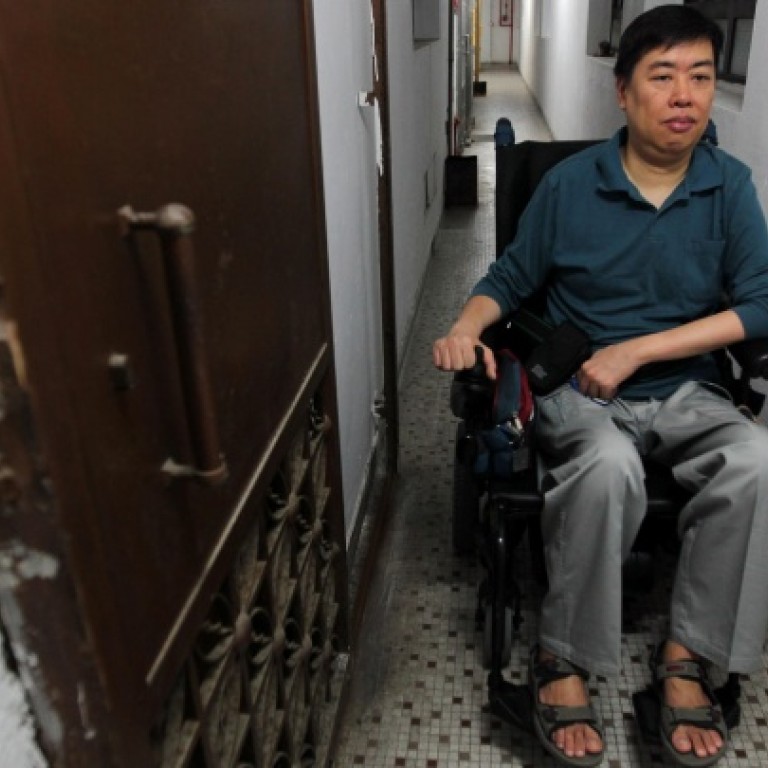
Doing the maximum good with minimal resources
Chairman of the Neuro-muscular Disease Association is grateful he is still able to fight for the rights of the severely disabled at the age of 51
At 51, Raymond Lau Wai-ming has met only five other people who've lived past 50 with his condition.

"For a person with a neuromuscular disease, I'm considered very old - just ancient," said Lau, who was born with spinal muscular atrophy, a genetic disorder that causes muscle deterioration and serious physical impairment.
"The fact is, our condition is not well known nor understood in society, and subsidies and help are extremely inadequate."
The fact is, our condition is not well known nor understood in society, and subsidies and help are extremely inadequate
Lau's condition was not properly diagnosed until he was 35, when he emerged from a 15-year bout of depression triggered by an accident.
Before that, he said, he had never had big dreams and was a "pessimistic, withdrawn and introverted type of person".
But by chance, he became the founding chairman of the Hong Kong Neuro-muscular Disease Association, which fights for the rights of the severely disabled and vows to make life better for people living with such conditions.
"I didn't have motivation. I just thought it was something to do, somewhere to use my energy. I thought of [advocacy and social work] as a video game. To win, players use the minimal resources and minimal time to do the maximum good - which is to help those like me."
But Lau realised after a while what a big difference the association was making. "We have members who rely on us to help them find enough funding for their medical bills, and to find sponsors for breathing ventilators when their health deteriorates," he said.
"I realised that if we stopped, these people might not live."
Funding for such patients and their families was very limited and it was common for them to be benefiting from three or more sponsors from private or government-related funds to keep on living, Lau said.
Welfare recipients have their medical bills covered by the government, but there are barely any funds for those not on welfare.
The Community Care Fund offers a subsidy to rent ventilators, but it is limited to people below the age of 60. There are also a handful of private funds that provide one-off lump sums for families taking care of severely handicapped patients.
Hong Kong society had the means to support people with neuromuscular diseases but little had been done in the past decade, he said.
Lau regards himself as one of the lucky few. His condition has degenerated slowly, meaning he is keeping his mobility longer than others.
Most people with neuromuscular diseases who survived complicated surgery during their childhood would not pass the teenage barrier, he said, when the body goes through a growth spurt, but muscles further degenerate and deteriorate.
"Many would die before the age of 30. So most wouldn't have the time which I have to do what I can do today," he said.
Lau was able to complete a Bachelor of Arts degree, and did not have to worry financially as his family could support him. He also holds down a part-time internet job.
There is no cure for the condition and usually a patient deteriorates until they no longer have even enough muscles to support their breathing. Then the difficult decision must be made on whether to insert a ventilator to prolong life. That decision involves constant family care and support, hefty medical bills and quality of life considerations.
Lau was able to walk until he was 12 and could use his hands and upper body to a reasonable degree until an accident last year. He has noticed that his physical abilities have deteriorated since then. "I wonder if my time has come," he said.
Because of his worsening condition, Lau says he is not likely to seek another term as president of the association when his current service ends next year.
"Dying is part of life, it's a natural thing," he said, noting that the association had seen more than 20 members die in the past year. "But there are a lot of regrets. The lack of financial support often brought extra and unnecessary pain to the patients and their families even in their last days."
He added: "My hope is to minimise regrets for the patients and their families. We hope to give them dignity."
